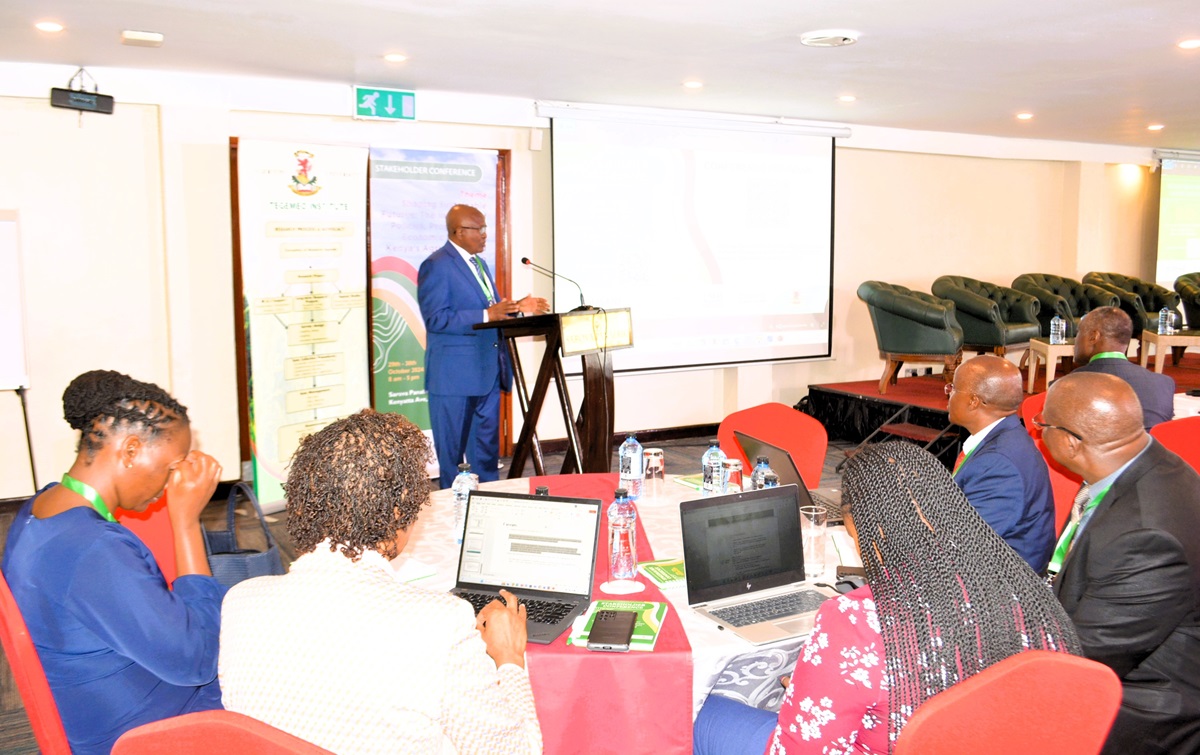October 29, 2024
By Kurian Musa
In a major effort to shape the future of Kenya’s agriculture, Egerton University’s Tegemeo Institute hosted a conference in partnership with Michigan State University and Purdue University. With the theme, “Shaping Sustainable Futures: The Influence of Policies, Programs, and Economic Factors in Kenya’s Agriculture and Well-being,” the event brought together key stakeholders to address the critical challenges facing Kenya’s agriculture sector today.
Egerton University Vice Chancellor, Prof. Isaac Kibwage, opened the event in a Nairobi Hotel on October 29, 2024. He acknowledged the urgency of sustainable solutions to the economic, environmental, and social shocks impacting agriculture globally. From the steep rise in fertilizer, fuel, and food costs to the relentless effects of climate change and the lasting repercussions of COVID-19, he noted, “Sustainability and resilience must take center stage in all policies and programs aimed at enhancing farmers' livelihoods.”
The conference, spanning two days, focused on four years of in-depth research on Kenya’s agricultural sector. Key topics included fertilizer and soil health, value chain development, human nutrition, youth employment, and strategies for building resilience among rural households. "These focus areas," Prof. Kibwage remarked, "are essential entry points for efforts to secure sustainability in agriculture and livelihoods."
Distinguished participants included farmers, government officials from both county and national levels, private sector leaders, development agencies, civil society organizations, and research institutions. Tegemeo’s ongoing collaborations with both Kenyan and international partners, including USAID and Michigan State University, formed the backbone of the research and policy insights presented at the conference.
Egerton University Vice Chancellor, Prof. Isaac Kibwage, addresses stakeholders at the Tegemeo Institute of Agricultural Policy conference on October 29, 2024, emphasizing the urgent need for policies to combat land fragmentation and enhance food security in Kenya. Photo: Kurian Musa/Egerton University.
For more than 30 years, Tegemeo Institute has played an instrumental role in shaping Kenya’s agricultural policy landscape. The Institute was actively involved in the creation of Kenya’s Vision 2030, a developmental blueprint that has guided Kenya’s investment agenda. Tegemeo has also contributed to other landmark documents like the National Food Security and Nutrition Policy and the National Agricultural Marketing Strategy.
One of the recent highlights in Tegemeo’s collaborative efforts is its contribution to the Africa Fertilizer and Soil Health Action Plan, which was adopted during the Africa Fertilizer and Soil Health Summit held in Nairobi this past May. Tegemeo researchers were key to conceptualizing and drafting research papers that informed this vital Action Plan. They also supported Kenya’s Ministry of Agriculture and Livestock Development in preparing the 2024 Seeds and Plant Varieties Regulations, which now await legal review.
Prof. Kibwage expressed deep gratitude to USAID, especially to Andrew McCowan, Feed the Future Coordinator and Director of the Center of Excellence for Resilience and Food Security, for their continuous support. USAID’s contributions have helped Tegemeo strengthen its research capacity, laying the groundwork for policy reform in Kenya’s agricultural sector through data-driven research. “We look forward to continued partnership with USAID in strengthening Kenya’s agricultural data systems, which are pivotal in guiding policy and program development,” Prof. Kibwage said.
Prof. Kibwage also praised Tegemeo’s longstanding collaboration with Michigan State University and Purdue University. MSU has been a crucial partner since 1997, contributing to the policy analysis capacity seen today, with special recognition given to Professor Mywish Maredia of MSU for her leadership in guiding Tegemeo’s research initiatives.
The conference concluded with a message of unity and determination. “Our collective efforts,” Prof. Kibwage said, “will contribute to crafting policies and programs that promote sustainable agricultural growth and resilient livelihoods for Kenya’s communities.” The outcomes of this conference are expected to provide actionable insights that will influence policy, ensuring a resilient agricultural sector and food security for future generations.









